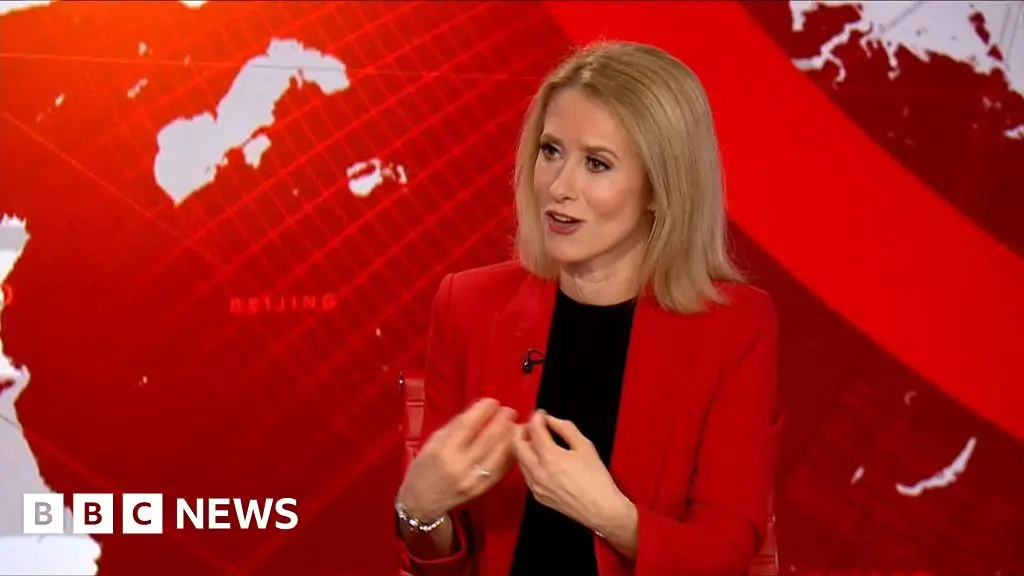Estonia’s Prime Minister, Kaja Kallas, has told the BBC that Russia’s Vladimir Putin is “afraid” of a war with Nato.
The leader of Estonia, which borders Russia, warned that while Putin is good at “sowing fear”, his threats must also be taken seriously.
Ms Kallas added that Nato countries do not want to go to war with Russia either.
She has previously called on European countries to bolster support for Ukraine, warning that war could expand “very fast in Europe, so no country is left untouched” if Vladimir Putin wins.
Let’s also not forget who she is
https://www.theguardian.com/world/2023/sep/13/estonia-prime-minister-husband-russian-business-links
@humbletightband @0x815
Lots of people made money out of Russia.
I did.
My brother still does.
Am I my brother?
I am not my brother’s
keeper and she isn’t her husbands.
What matters is that she’s a very strong supporter of Ukraine.
Guilt By Association is popular in Russia. Stalin used it all the time.
Do you like it?It’s less emotional.
She’s a politician and her family was profiting off Russia and off Russian sanctions. She has a conflicting interest in maintaining the slow pace of this war and ending the war.
Well, of course he is. He’s evil, not crazy. He knows he would lose that war very badly.
lmao in a war vith nato putin gonna have weeks until a missile find his home
weeks might be pretty generous.
Transscript:
We have heard from Vladimir Putin if there is this continued strength in the war in Ukraine if the U.S. and all the countries continue to contribute, he has continued to raise the possibility of a nuclear threat. Is that one that you take seriously or worried about?
[Kallas] Of course, we have to take everything seriously, what he says. He has been threatening with the nuclear war for quite some time, but it has been only words. He’s very good in sowing fear within our societies and really listening what we are afraid of and giving you the fears that you have, [ okay, you are afraid of the nuclear war, so I’m giving out this kind of signals and the public goes, oh wow, we can’t do that. It is a trap, a trap of self deterrence, ] because if we are afraid, then we start to self-deter, and that is what Putin wants. [ So we also have to think what Putin is afraid of, and he is actually afraid of going to war with NATO. So he doesn’t want that, and we of course don’t want that either, but it is to understand the messages that he’s giving out ] so that we would be afraid and refrain from the decisions that we would otherwise make.
Emphasis mine.
Often people confuse hereditary with monarchy. I’d claim that Mr Putin is a monarch
@humbletightband @SamsonSeinfelder
Putin is Peter the Great’s son.Son? You probably mean successor or heir.
If so, Putin actually thinks of himself as a successor of Alexander the Third. It’s one of a few things I agree on with him.
@SamsonSeinfelder @0x815
Russia has been threatening the West with Nuclear war since 1949.
These’s nothing new here.Dude, that was just an example she made. There are so many fears he controlled in the last 10 years. How many microtargeted messages over facebook did putins trollfactories and Cambridge Analytica transmissioned? You have to understand that it goes down to the fears of single persons. Someone is afraid of foreigners and immigrants, there was a playbook and memes for these people. You have the fear of economical outlook, there was a folder with images to post for that. Your fear is democrats in the white house? Fear of black people looting cities? Caravans at the border? Socialists in the Government? President takes away your guns? Homosexuals? Nuclear War? There was a playbook do target all these people to cook a vast part of the society crazy and made them afraid of their own fears coming true - even if reality was not like that and they were concerted fed confirmation bias by anecdotal evidence, but amplified.
Yes, there is much evidence of fear as the principal response to threat with direct impact on decision making. There’s vast amount of literature about it, one thing I quickly found is a piece written by political scientist George Marcus, emeritus professor of political science at Williams College:
… increasing fear reduces the influence of otherwise salient political dispositions, and that fearful citizens will be less influenced by their partisan attachments or their ideological convictions.
There is a rich empirical literature that seems to confirm the conventional account that fear causes people to seek strong conservative leaders and to endorse authoritarian policies and parties.
An important piece of communication here is the creation of an enemy - the migrants, the refugees, the West, the Nato, … It works (and has been working) in all human societies.
What exactly are you implying? Do you think that Putin has planted conservatives and made himself the enemy?



